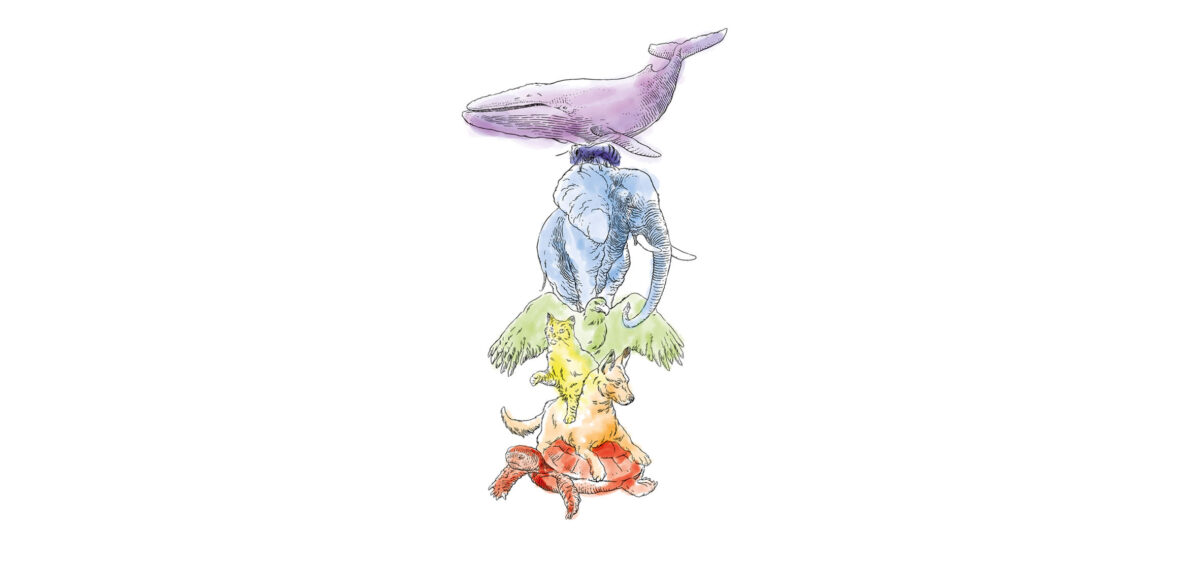
Berenika Steinberg talks to Filip Kołodziejczyk, a cognitive-behavioural therapist, certified mindfulness teacher and coach, and director of the Polish Mindfulness Association.
Berenika Steinberg: Since the outbreak of the pandemic, I cannot keep myself away from the news channels. I follow three different platforms simultaneously at all times, and I feel like my head is going to explode. Worse still, I cannot stop doing it, even though I know the more I read, the more stressed out I become.
Filip Kołodziejczyk: What you are feeling now is the need to control the reality around you, seeing when it’s going to end, what threats might be coming your way. But the current situation uncovers a certain truth that seems to elude us in everyday life: that the sense of security we create for ourselves, and our efforts to control the reality we live in, are nothing more than a delusion. Achieving such a level of certainty right now is simply impossible. Of course, when danger arises, we should be prepared and know how to protect ourselves best. However, as you have pointed out, following the news constantly gives us neither a solution nor peace of mind. What’s more, the heightened level of stress that news induces can lead to lowering our immunity – a particularly harmful side-effect right now.
Well, what should I do then? Stop reading the news altogether?
Just like with everything else in life, here, too, we should seek some healthy balance. Finding reliable sources of information and securing our safety in a feasible way is one thing; overloading our minds with intensely negative news is something else. I think that in our current situation, we should work on simply being present in our experience, and give up the need for control. Meditation practices are a great way to help us with it. Many meditation centres around the globe are now offering help by organizing meditation practice sessions online.
Why does meditation seem to be so helpful right now?
During times of destabilization and overload of stimuli, we need its techniques more than ever. We need a way of stepping away from the mode of active thinking, which turns out to be ineffective right now; after all, we will not be able to come up with an infallible plan of securing our well-being, and we have no certain knowledge of when the epidemic will come to an end. Therefore, we should switch to the mode of just being. Meditation is a moment of connecting with our inner self, singing our breath. This allows the mind to quiet down, stopping the constant rush of racing thoughts and analyses. Right now, we are spending most of our time at home, so it’s good to divide it so that we can also learn how to be present when doing simple chores, or interacting with household members
Sounds lovely. But let’s imagine a family stuck together for days in a cramped little flat, forced to work from home while home-schooling their children. All this comes with a constant overload of stimuli, without a single moment’s respite. It does not look like the perfect conditions for daily meditation, or a mindfulness-infused dishwashing exercise.
When it comes to our family situation, it’s good to try and just accept the fact that it is difficult right now. In such circumstances, it would be unrealistic to expect a perfectly-functional parenting track record, or maintaining peace and harmony at all times. So perhaps it’s better not to raise the bar too high at the very moment when keeping up with it is simply impossible.
But perhaps it’s no longer the case of achieving some inflated goals, but just maintaining some sense of calm? A few days ago, I yelled at all my household members and then broke down in tears. And I am confident that the cause of my behaviour was rooted in the epidemic and the stress it generated in me.
What you just told me is an excellent example of a situation where we are struggling to cope, and that it is perfectly natural to feel this way. The important thing is not to scrutinize ourselves for every tiny setback that will be unavoidable during this time. We might feel an urge to scream, become annoyed or angry. Obviously, I’m not saying it is a good thing, but it might become hard to avoid when problems start piling up with nowhere to vent. Among my friends and patients with children, problems are multiplying with geometric progression. Regardless of how their families used to function before the lockdown, now I can see that all of them are going through some kind of crises or hard moments. In those cases, I would recommend not only breathing meditation – which is helpful to anyone – but also all compassion-centred practices.
Is that some special kind of meditation?
This practice is called ‘metta’, or loving-kindness meditation. It is based on the premise of building a kind intention of compassion towards oneself and all others. It can be done in an informal way; it doesn’t necessarily require sitting down on a pillow. For example, whenever we start thinking about this difficult situation, all the human suffering, uncertainty and stress it induces, let’s try not to analyse it and think what else we could do. Instead, let’s focus on creating an intention of tenderness and imagine that we are sending kindness and warmth to all the people who are struggling right now. You might try thinking repetitively: may we all be healthy, may we all be safe – or something along those lines.
It sounds a bit like a prayer.
Indeed, this practice is not unlike certain forms of prayer. I think that, especially in these challenging times, it can be very fruitful and good for us. At this moment, we are often unable to help our loved ones in any tangible way. We don’t know what to do other than keeping hygiene measures up high; trying to keep safe. This practice can make us feel that we are actually doing something. I think it is also important to try and find some ‘me time’; to make space for enjoyment, even. And surely, it would be good to strive to find more patience for the people around us. We are all in it together, and we are all experiencing this struggle right now.
We said it is a difficult time for the families. But the situation of those who are on their own is surely just as difficult, even though they don’t suffer from the barrage of stimuli.
Meditation requires space. In this aspect, we could say circumstances are more favourable for lonely people. Just a regular breathing practice might help to distance ourselves for a moment, stop thinking about why we are in this situation or how to change it, and just give our minds some quiet time. Meditation practices are often used in situations that force us to go into some sort of isolation. By the way, this is why meditation is so popular in hospitals or prisons. It is one of the very few forms of activity people can do in such places while allowing them to maintain their well-being, which proves to be especially important in those times when we are alone and have nobody to lean on.
Some people are in denial about their fear of the epidemic. Sometimes, they insist there is no real danger, even though, deep inside, they might be really frightened. How do we face our real emotions? Is it even a good thing to try and deal with them at all right now?
Sometimes, it is tough to open up to the vastness of suffering or uncertainty around us. Still, we should not strive to block those feelings, but try to embrace them. Treat those feelings with understanding and compassion, let them be there. After all, they are nothing but natural right now. We can calm our minds down with meditation, but it is not about dampening our fears or pushing them away. We just need to distance ourselves from them, see them from a different angle. Dealing with emotions is never easy in general. Handling them through meditation or other mindfulness techniques is always a challenging task that requires a certain amount of care and skill. When we cast our gaze inwards and take a look at our feelings, we can let them be. We can see they are reasonable and that we are allowed to experience them. Moreover, it helps us understand that the presence of those emotions will not harm us as long as we allow them to sit there, without denial or fighting them back. Then we give them a chance to just float through us and end in a natural way, like any other emotional process that has its beginning and its end.
Meditation instructions:
Breathing meditation
Sit comfortably with your back straight on a chair or on a meditation cushion. Make sure you’re sitting with your back elongated, your chest open, shoulders relaxed, and hands resting loosely on your legs. Your head should be in one line with your back. Feel the whole of your body, realize its weight, the spots that are now touching the seat and the floor. You can close your eyes if you want to, and if you prefer to keep them open, cast an unfocused gaze downwards.
Once you are connected with your body, seek all the sensations that are connected to breathing and focus your attention solely on them. Give up the urge to control your breathing and let it flow freely.
Your attention and focus will naturally start wandering. Whenever you stop feeling your breath and start following some thoughts, just acknowledge them, whatever they might be, and gently return your focus to your body and breathing.
Metta / Loving-Kindness
Sit comfortably with your back straightened. Close your eyes; this way, it will be easier for you to control your focus. First, draw your attention to your breathing, and then imagine someone to whom you feel close. Make it someone towards whom the feelings of kindness and warmth come naturally.
Once you imagine them, begin directing good intentions towards them, enforcing them with words you can repeat in your mind. Traditionally, those words are as follows:
May you be happy, may you be healthy, may you be safe, may you live in peace and harmony.
You can also repeat good wishes of your own choice if you find the words that fit the situation better.
Now imagine that you are sitting next to this person. Encompassing both of you with kindness, start repeating the words directed at both of you:
May we be happy, may we be healthy, may we be safe, may we live in peace and harmony.
In the next stage of this exercise, you can stretch your kindness to encompass all the people around you, close and distant, the ones you like, the ones that are neutral to you, and even those with whom you find it difficult to connect. Directing your kindness as widely as possible, repeat the words enforcing your positive intentions, and try to connect the sensations coming from your body to those words.
Sometimes, while doing this practice, instead of kindness and compassion, you might feel something very different, such as irritation, anger or jealousy. Do not judge those emotions. Keep in mind this is not a mistake, but rather a symptom of a heart opening up and revealing its depth.
Translated from the Polish by Aga Zano










